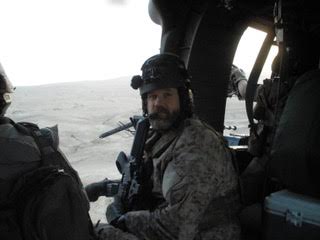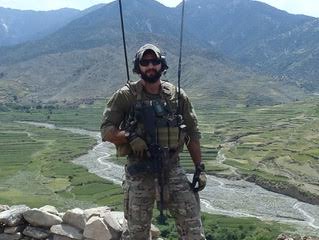The Air Force Cross is the highest service specific award an Airman can receive, and the second highest military decoration for valor awarded by the United States. It represents gallantry in action against enemies of our nation, but in many ways, it represents much more. Being awarded the Air Force Cross places airmen in a class all their own; as representatives of the very best traits a serviceman can possess: courage, strength, and a willingness to sacrifice not only for our great nation, but for the men and women in uniform that stand beside them.
Only ten airmen in the past forty years have been the recipient of the Air Force Cross, with none more deserving than Staff Sergeant Chris Baradat and Master Sergeant Keary Miller.
On Thursday afternoon, beneath blue skies and before a crowd of service men, women and their families, Staff Sergeant Baradat and Master Sergeant Miller were presented this high honor for incredible acts of bravery that not only resulted in killing enemy combatants, but in saving the lives of dozens of soldiers and airmen. Each American life saved by these two heroic men represents much more than a single day of valor in Afghanistan; they represent a lifetime of days the men they saved can now spend serving our nation, loving their families, and enjoying the very freedoms they fought to defend. Through their actions, Baradat and Miller demonstrated that the highest achievement an American service member can accomplish is not always to kill an enemy, but rather, it’s often to save the men and women that fight alongside them.
Colonel Mike Martin welcomed attendees to the ceremony, which served as the first ever to see two Airmen receive the coveted honor of the Air Force Cross. The peaceful day and respectful ceremony meant to commemorate these men’s actions served as a stark contrast against the circumstances that led them there. From the well-kept fields of Pensacola, Florida, one might struggle to picture the snowy mountains of Afghanistan that saw then Tech Sergeant Miller running through the snow to the aid of fallen soldiers under heavy enemy fire, or the narrow canyon Staff Sergeant Baradat chose to willingly brave outside the protective armor of his vehicle in order to accurately direct the air support that saved dozens of lives.
“The special tactics community knows that to save a life, you sometimes must risk a life.” General David Goldfein explained to the crowd. He knows from experience, as a fighter pilot that once had to eject over Serbia when struck by a surface to air missile. The general himself was saved by Air Force pararescuemen that day, and spoke to the honor he felt in presiding over Thursday’s ceremony.
On March 2nd, 2002 – less than a year after a terrorist attack would launch the United States into the global war on terror, Keary Miller was the Air Force combat search and rescue team leader assigned the unenviable task of recovering two American soldiers striving to evade capture in an area of Afghanistan occupied by large Al Qaeda and Taliban forces. His team’s helicopter received heavy fire from machine guns and rocket-propelled grenades immediately upon entering the area, forcing them to crash-land.

Master Sergeant Miller’s assault force debarked the downed craft and established a hasty defense, but were immediately met by fire from fortified positions. Three members of his team died immediately, and five more suffered critical injuries. Over the next eighteen hours, Miller would gather ammunition from the deceased and repeatedly cross open areas ripe with enemy gunfire, rocket-propelled grenades and mortar fire to distribute the ammunition from position to position. As further attacks ensued, he would relocate the dead and provide lifesaving care for the wounded, even going so far as to remove the tail gun from the MH-47E helicopter and repositioning it to provide rear security, and pulling insulation from the damaged craft’s body to help keep the wounded warm.
Thanks to his bravery, clarity of thought, and unrelenting willingness to place the safety of his men above his own, Miller was responsible for evacuating ten gravely wounded airmen and soldiers from the battlefield that day, as well as the recovery of seven servicemen killed in the brutal fight.
More than ten years later in the Kunar Province of Afghanistan, Staff Sergeant Christopher G. Baradat, while assigned to a U.S. Army Special Forces team serving as a quick reactionary force, entered the Suno Valley to assist a pinned down coalition element. They soon realized their armored MATVs wouldn’t be able to traverse the shortest route to their allies under fire, so Baradat and eight other SOF teammates disembarked into smaller vehicles first, before ultimately foregoing the protection of their trucks and moving in to assist on foot. They were met with heavy and accurate gun fire by the time they were within 1000 meters of the pinned down element, and Baradat successfully coordinated air assaults from A-10 Warthogs above to eliminate the first enemy positions and allow them to move to within 200 meters of the pinned down allied position.

Already have an account? Sign In
Two ways to continue to read this article.
Subscribe
$1.99
every 4 weeks
- Unlimited access to all articles
- Support independent journalism
- Ad-free reading experience
Subscribe Now
Recurring Monthly. Cancel Anytime.

Staff Sergeant Baradat, realizing he could not effectively coordinate air support from his covered position due to the inability to maintain line of sight with the aircraft in the vicinity, braved enemy gunfire from an open and unconcealed position for three hours as he worked with A-10s and C-130 Gunships overhead to continue the assault on more than a hundred Taliban and Al Qaeda militants that had amassed in elevated positions on either side of the valley. Once Baradat and his team were able to regroup with the pinned element, a new volley of gunfire erupted, and Baradat chose to remain outside the armored vehicles they used to escape the valley in order to continue to coordinate the air support that saved their lives. His efforts left more than 50 enemy combatants in thirteen separate positions dead, and resulted in the safe extraction of over 150 allied fighters.
But as the Florida sun shined brightly over these two heroes on Thursday, the chaos of those arduous days long behind them, they weren’t just Airmen who had gone above and beyond to save their brothers in arms; they were human, mortal, flesh and blood reminders of the courage and sacrifice American men and women demonstrate all over the world each day. They were regular people who had chosen to serve. They stood proud on Thursday afternoon as brothers, sons, and parents themselves – showing us all that courage and heroism aren’t the product of some special training or unique genetics.
Staff Sergeant Chris Baradat and Master Sergeant Keary Miller showed us that heroism is alive and well in America’s armed forces, and that it’s the product of choices being made on battlegrounds every day. These two men chose to value others over self, to honor their flag and their nation, and to fight for the lives of their brothers in arms. Their choices represent the very best in us, as they represent the very best of us.
On behalf of a grateful nation, we at SOFREP extend a heartfelt congratulations to these men, as well as our most sincere gratitude.
Images courtesy of the U.S. Air Force












COMMENTS